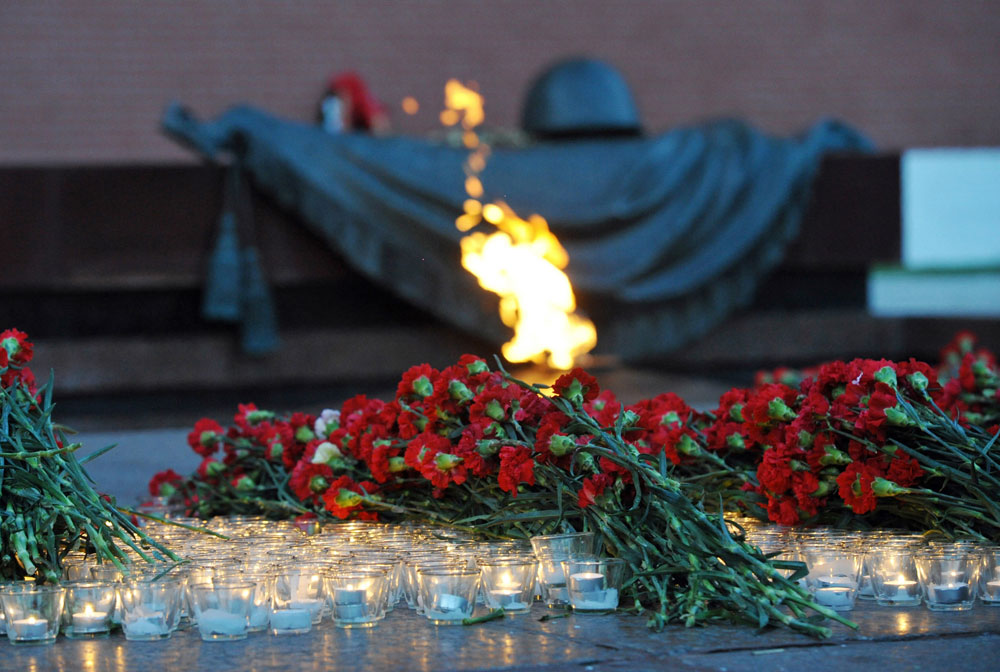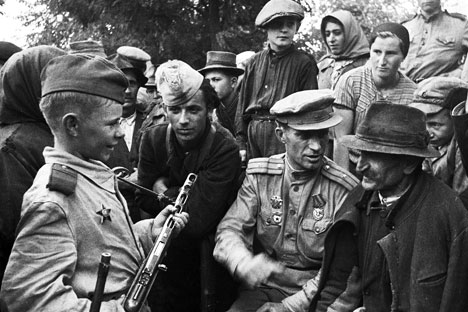What to tell our children

Candles and flowers placed at the Tomb of the Unknown Soldier in Alexander Gardens (Alexandrovsky Sad), Moscow.
Artyom Korotayev / TASSEver since I became an adult I always spend the morning of May 9 according to the same routine. I wake up early while everyone is still in bed and watch a couple of old Soviet films about how boys and girls lived and died in that war. The films can be different but the result is always the same: by the time my adolescent daughter appears in the kitchen I have already managed to cry my eyes out.
Looking at my red eyes and hearing the roar of planes flying by (we live in anarea which the planes fly over on the way to the parade), she looks with a perplexed glance at the TV screen, on which the tanks are moving through Red Square, then at my wet face, then again at the tanks. She does not understand why I am crying and while I still cannot articulate any words.She pays sincere attention to the various journalists, politicians and officials - between the images of the parade – who congratulate viewers on the victory over fascism, on the glorious deed of our people.
At that moment it is as if I was listening to them with my daughter's ears and looking at them with her eyes, understanding that their words mean absolutely nothing to her and therefore I cannot explain why I am crying. One cannot cry from their words, nor laugh – they are deprived of real feelings and resemble memorized slogans. Just like my daughter I feel that they are insincere and provoke a sharp dissonance with what I feel inside and with what I was crying about all morning.
When everything ends I decide to speak. I begin with an attack. I say: "But don't you feel anything?"
"What should I feel?" she calmly parries my accusation. "I only know that this is Victory Day in the Great Patriotic War. We are told this at school," she says, her voice becoming softer, more exhortative. "We are told that it was frightening, difficult, but that it was a long time ago. Your grandfather fought there, but I never even saw him. Now we have exchange programs with German schools. German students come here. They are no longer our enemies. What's there to cry about?"
I open my mouth but the words rushing to my head are like the jarring mantras spoken on television. And even though I try to avoid the hackneyed clichés, everything I say is the same old stuff about how the people got together and defeated the enemy, about the heroic deaths of the Soviet boys and girls, those similar to my daughter.
But all this was not what I had wanted to say. I felt that my words did not speak of any important matters to my daughter and I did not reach her heart. It seems that words also have an expiration date, especially lofty words. And if they are used too often and senselessly – and we all have the hypocritical tradition inherited from the last Soviet years, whose patriotic education often had people use sterile, empty words without believing in them and not feeling anything – they fade and lose their value and meaning.
But can I really use words that would also be clear for my daughter to explain to myself the reason for my tears? My grandfather, who honestly speaking practically brought me up, almost never talked to me about the war. He spoke about many things, but he would talk about the war only when I really got to him, and only with one and the same sentence: “As soon as I remember, my heart begins aching.” He would speak about how he was always hungry as he went through the intensive tank training in Gorki (Nizhny Novgorod) but would never speak about how orhow many times he got burned in atank. He would mention fragments.
 My grandmother and grandfather, Klavdia and Yuriy Gakov, Moscow, 1948. Source: Personal archive
My grandmother and grandfather, Klavdia and Yuriy Gakov, Moscow, 1948. Source: Personal archive
When we would walk along areally slippery and dirty path I would fall frequently, but he would never slip. He taught me that I just needed to put my foot down harder, adding that he had learned to walk this way when they made their way70 kilometers to the front several days in a row. Or when they slept in the snow - two people in a pit, back to back, laying a chopped spruce under themselves. I knew that the war still lived in him, but it never poured out onto me, and it never traumatized and overwhelmed me. What else? He never spoke about heroism and he never wore his medals. He was realistic, humble, non-partisan and apolitical, anti-grandiloquent, not at all to be placed on a pedestal, always happy to reap, to dig out potatoes, chop firewood, work the nightshift if during the day he had to take care of me. He loved to read Esenin, write poetry on winter evenings (and he dedicated a few poems to me, which gave me lots of joy).
Perhaps he is still one of the most important people in my life. But what has this got to do with the war? The Germans are indeed no longer our enemies and I hope they never will be. But back then it had nothing to do with the Germans. It is completely clear that the force engulfing them was supranational. It is not without reason that British historian Eric Hobsbawm described World War II not as a war between different nations, but as a global civil war in which the confrontation within various countries consisted of forces that submitted to Nazism and those that opposed it. It had nothing to do with Germans as such, but with the horrible vortex that had swallowed up entire nations and peoples.
The phenomenon of Russians and their country, regardless of how it was back then and who ruled it, consisted of the fact that when the final hour had struck they were able to forget about all the little things that their life was made up of and oppose this vortex, and in the end not allow it to swallow up everyone else. It is not in vain that after the war many of the best people in the country and the Soviet intelligentsia had the feeling that during the war, despite the horror, pain and difficulty, the inhuman system took a step backwards and people could live openly and genuinely. After the end of the war the suffocating claws of the Soviet system came down again, but the people remained with the breath of freedom and the moment of truth that they had experienced as they stood on the verge of death. Did I feel this miracle in the life of such an unnoticeable person as my grandfather? Perhaps, due to everything he had been through, he had an enormous inner space that gave him the opportunity, even though he was small, to embrace the entire world. And I also had this opportunity.
And I cry each May 9 not because I pity him, a survivor, or those who died, like the girls - my daughter's peers - from the 1972 Soviet war movie “The Dawns Here Are Quiet” (in which a platoon of clever young womenmanages with unbelievable fortitude to give the fascist reconnaissance unit the impression that it is fighting real troops). I cry from the sort of catharsis that I experience every year from the feeling of my personal participation in the events of those distant years, which for me occur now and here. Just like the ancient Greeks I feel myself in them and them within myself. As is known, there is no time if there are eternal essences. And the eternal essence of this war is that it perhaps crystalized a very valuable trait in many of us: the last resistance for truth before the open abyss at the end of the world.
The Unknown War: Family stories of RBTH editors>>>
All rights reserved by Rossiyskaya Gazeta.
Subscribe
to our newsletter!
Get the week's best stories straight to your inbox

